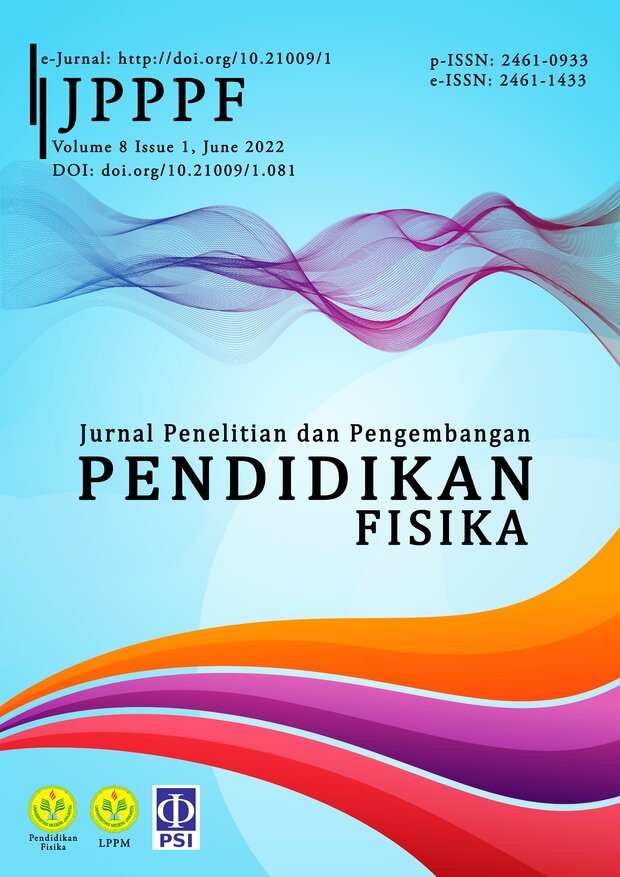Development of Sophisticated Thinking Blending Laboratory (STB-LAB) to Improve 4C Skills for Students as Physics Teacher Candidate
DOI:
https://doi.org/10.21009/1.08107Keywords:
4C skills, blending laboratory, laboratory activities methodAbstract
The 21st Century Learning is an increasingly interactive and attractive learning era. The learning process in the 21st century does not only focus on teaching and learning activities in the classroom and explaining theories. There need to be laboratory activities that help provide visuals to students, especially future physics teacher candidates. Various innovations have been made in the development of laboratory activity models. There are still many laboratory activity models that focus on one activity, namely real or virtual. Laboratory activities in the 21st century do not always have to focus on super skills or 4C skills currently in the spotlight and forget about analytical skills and the balance between LOTS and HOTS. This study aims to develop a mixed laboratory activity model that can build 4C skills focused on analytical skills and balance between LOTS-HOTS; in addition, two activities are combined into one, real and virtual. The method used in this research is in the form of Research and Development using the ADDIE model with three meetings in implementation. The results obtained in this study, namely STB-LAB, obtained good model and guide validity results. N-Gain data showed that in the control class, only creative thinking skills were compelling enough, with a value of 59.47. In contrast, in experiment class, only communication skills have an effective enough category with a value of 57.84, but other aspects have an effective category with a value > 76.00. The hypothesis test showed that using STB-LAB could improve students as physics teacher candidate 4C Skills.
References
Ali, Mohammad, 2007. Ilmu dan Aplikasi Pendidikan. Bandung. PT Imtima.
Arikunto, Suharsimi. 2010. Prosedur Penilaian: Suatu Pendekatan Praktik. Jakarta: Rineka Cipta.
Ardhian, T., Ummah, I., Anafiah, S., & Rachmadtullah, R. 2020. Reading and Critical Thinking Techniques on Understanding Reading Skills for Early Grade Students in Elementary School. International Journal of Instruction, 13(2), 107-118.
Baharuddin. 2010. Psikologi Pendidikan. Jogjakarta: Ar-Ruzz Media.
Dalyono. 2012. Psikologi Pendidikan. Jakarta: Rhineka Cipta.
Darmawan, Deni. 2013. Metode Penelitian Kuantitatif. Bandung. PT Remaja Rosdakarya.
Gunawan, Yusuf. 2010. Landasan Bimbingan dan Konseling, Bandung: PT Remaja Rosdakarya.
Iskandar. 2008. Metodologi Penelitian Pendidikan dan Sosial (Kuantitatif dan Kualitatif). Jakarta: Gaung Persada Group.
Kementerrian Pendidikan Kebudayaan. 2014. Materi Pelatihan Guru Implementasi Kurikulum 2013 Tahun 2014. Jakarta: Pusat Pengembangan Profesi Pendidik
Lie, Anita. 2008. Cooperative Learning: Mempraktikkan Cooperative Learning Di Ruang Kelas. Jakarta: Grasindo
Mahanal, Susriyati, dkk. 2009. Pengaruh Pembelajaran Project Based Learning (PjBL). Bandung: Rosdakarya.
Malawi, Ibadullah. 2011. Penelitian Pendidikan. Madiun: IKIP PGRI Madiun.
Martono, N, 2011. Metode Penelitian Kuantitatif. Jakarta. PT Rajagrafindo Persa
Nasution, Thamrin., Nasutin, Nurhalijah. 1989. Peranan Orang Tua dalam Meningkatkan Prestasi Belajar Anak. Jakarta, Yogyakarta. Gunung Mulia.
Riduwan. 2004. Metode Riset. Jakarta: Rineka Cipta.
Sani, Ridwan Abdullah. Pembelajaran Saintifik untuk Implementasi Kurikulum. 2013. Jakarta. PT Bumi Aksara.
Sanjaya, W. 2010. Strategi Pembelajaran Berorientasi Standar Proses Pendidikan. Jakarta: Kencana
Sardiman. 2008. Interaksi dan Motivasi Belajar Mengajar. Jakarta: Raja Grafindo Persada.
Slameto. 2010. Belajar dan Faktor-Faktor yang Mempengaruhi. Jakarta. Rineka Cipta.
Stripling. B. dkk. 2009. Project Based Learning: Inspiring Middle School Students to Engage in Deep and Active Learning. New York: NYC Department of Education.
Sudjana, Nana. 2009. Penilaian Hasil Proses Belajar Mengajar. Bandung: Remaja Rosdakarya.
Sugiono. 2011. Pedagogik Terapan. Surabaya.
Sugiyono. 2009. Metode Penelitian Pendidikan (Pendekatan Kuantitatif, Kualitatif dan R&D). Bandung: IKAPI
Thomas, J.W. 2000. A Review of Research on Project Based Learning. online.
Wena, M. 2009. Strategi Pembelajaran Inovatif pedagogik. Jakarta: Bumi Aksara
Guo, S. & Yang, Y. (2012). “Project-Based Learning: an Effective Approach to Link Teacher Professional Development and Students Learning”.
Tiantong, Monchai., Siksen, Sumalee (2013). “The Online Project-based Learning Model Based on Student’s Multiple Intelligence”.
El-sadi, Haifa (2015). “Project Based Learning – Virtual Lab: Heat Transfer”.
Gangga, Almes., Jama, Jalius. “Penerapan Model Pembelajaran Project Based Learning dalam peningakatan motivasi dan hasil belajar siswa kelas XI TOSM I Kompetensi Keahlian Teknik Sepeda Motor SMKN I Koto XI Tarusan”.
Pradita, Yulistyana., Mulyani, Bakti., Redjeki, Tri. “Penerapan Model Pembelajaran Project Based Learning untuk meningkatkan prestasi belajar dan kreativitas siswa pada materi pokok sistem koloid kelas XI IPA Semester genap Madrasah Aliyah Negeri Klaten Tahun Pelajaran 2013/2014”.
Rachmadtullah, R., Harlinda, S., & Rasmitadila, R. 2020. The Role of Civic Education Teachers in Implementing Multicultural Education in Elementary School Students. Universal Journal of Educational Research.
Sandi, Aris., Ni Kt N, Garminah Ni Ny, Pudjawan Kt. “Pengaruh Model Pembelajaran Berbasis Proyek (Project Based Learning) terhadap hasil belajar IPA siswa kelas IV SD N 8 BANYUNING”.
Kamayani.A. Diah, Sumantri. Md, Nym Sudana Dw. “Pengaruh Model Pembelajaran Project Based Learning Berbantuan Media Tiga Dimensi Terhadap Hasil Belajar IPA di SD Gugus XI Kecamatan Buleleng”.
Susilaningsih Eko Mawarsih, Hamidi Nurhasan, “Pengaruh Perhatian Orang Tua dan Motivasi Belajar Terhadap Prestasi Belajar Siswa SMA Negeri Jumapolo”.
http://www.academia.edu/6808732/MAKALAH_PERMASALAHAN_PENDIDIKAN_DI_INDONESIA_BAB_I_PENDAHULUAN Diakses tanggal 8 Juli 2021 jam 09.45
https://nuzan.wordpress.com/2012/07/21/pengertian-pbl-project-based-learning-pembelajaran-berbasis-proyek/ Diakses tanggal 5 Juni 2021 jam 09.45
http. www.scribd.com Diakses tanggal 18 Januari 2021 jam 18.30











